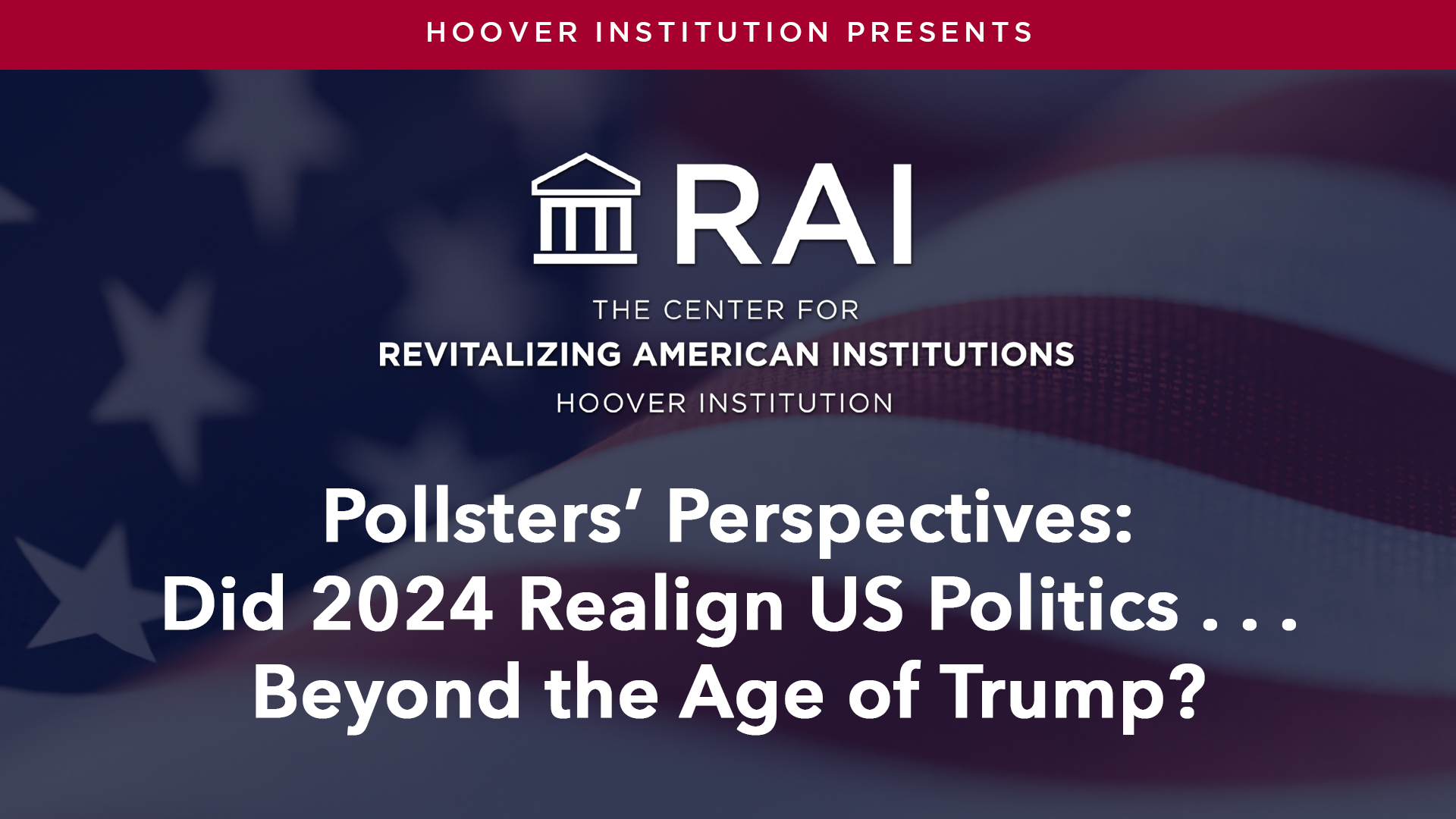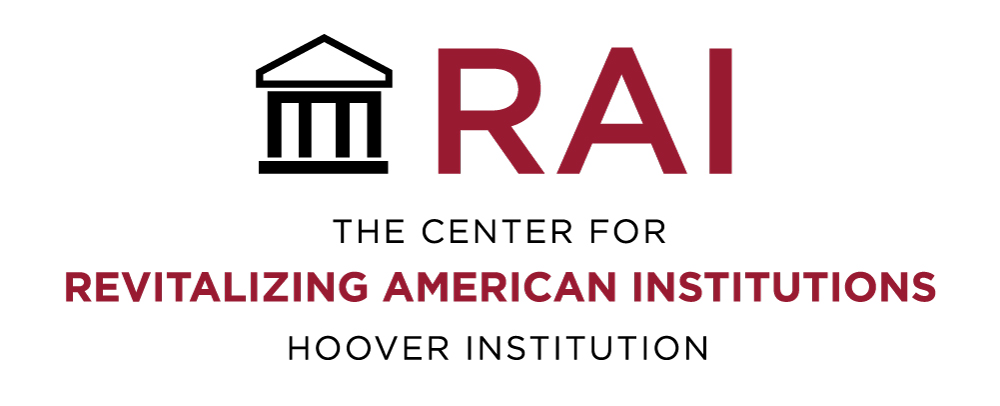- Politics, Institutions, and Public Opinion
- Public Opinion
- Revitalizing American Institutions
- Understanding Public Opinion
While last year’s US presidential election didn’t lack for historical quirks – an incumbent president dropping out of the race soon before his party’s convention; for only the second time, a former president returned to office – opinions differ as to the campaign’s long-term effect on America’s political landscape.
In a special edition of Matters of Policy & Politics hosted by Hoover distinguished policy fellow Bill Whalen, we hear from a bipartisan slate of leading pollsters on the state of America’s two political parties. They provide perspectives on the 2024 election, including assessments of what did and did not work in terms of messaging, how voting blocs shifted, whether Democrats can rebrand and rebound by 2028 or anti-woke Republicans once again will prevail, plus the chances of Trump-style politics outlasting its term-limited namesake.
This episode is in partnership with the Center for Revitalizing American Institutions (RAI).
WATCH TO THE EPISODE
>> Bill Whalen: Hi, I'm Bill Whalen. I'm a Distinguished Policy Fellow here at the Hoover Institution. The reason why I'm here today is I want to explain to you what you're about to see. It's something a little different. Earlier today, we convened a conference of pollsters here at Hoover under a program that we call the center for Revitalizing American Institutions.
That's a very broad title and goes a lot of directions, one of which is politics and confidence in elections and our political leaders. So we thought it was a good idea to bring together pollsters of all persuasions, Democrats, Republicans and a few in between, and have a conversation about what transpired in 2024.
And they see the country going in 2026 and 2028, the next two elections. So what you're about to see is a series of breakout interviews from the conference. We brought them together, talked to them for about 5, 10 minutes and took a few selections from what they talked about.
Now, I'm a political jockey. So I was very fascinated about this. And there's some very interesting takeaways you're going to find here, one of which is that the Republican Party, in their estimation, is the party of Donald Trump. This was not the case in 2016. But eight years later, Donald Trump has a definite hold over the Republican Party.
Conversely, the Democratic Party. What comes next for Democrats? Well, reports of the Democratic death might be greatly exaggerated. They have a pretty good bench of governors sitting out there and elected officials. It was a pretty close election, so maybe they'll bounce back in 2028. But what the pollsters talked about was just what issues resonated with voters.
Not just the obvious, such as crime, such as inflation, such as immigration, but also certain breakout issues, cultural issues. So stay tuned, watch the following interviews and we'll be very curious about what you think about this. Give us your feedback, tell us what you like, what you didn't like.
Look forward to reading it. So enjoy the show.
>> Bill Whalen: Well, that seems to have shifted in the country from Donald Trump's first election in 2016 to his loss in 2020 to a second victory in 2024. What changed and what got us to where we are today and what we saw on election night.
>> Patrick Ruffini: I believe that there was a, in the wake of Trump's 2016 victory, there was, I think, a misunderstanding of the American electorate, a widespread misunderstanding that really peaked during the Obama era, which said that as the country grows more and more non white, as by 2045 or 2050, America becomes this so called majority minority country, Republicans just wouldn't have a shot to win elections because the country is just growing so much more diverse and these diverse electorates are choosing Democrats.
But what we found in 2016 was, you know, things don't happen until they do happen. And you saw the blue wall collapse. You saw Trump really make inroads with white working class voters in those upper Midwestern states that I don't think anybody really foresaw the magnitude of before that election.
>> David Binder: Trump's success in 2024 was in some part due to failures of the Democratic Party to connect with certain aspects of the electorate that had nothing to do with Donald Trump. He was able to take advantage of unhappiness with the status quo and whether it's immigration, economy, and in some cases some social issues wokeism and transgender rights and things like that.
The one thing that Donald Trump was able to do, other than ending taxes on tips, is there weren't too many people focused on his policy prescriptions.
>> Anna Greenberg: Well, the Democratic Party over a number of years has become increasingly feminized. And I don't mean feminine, but feminized in the sense that both the composition of the party is more and more female and the positions that the party takes are more feminist, for lack of a better word.
And one of the biggest shifts we saw was in the 2018 campaign when post2016, you saw the movement of white college educated women to Democrats, there was a massive shift between 16 and 18. And that shift has really endured. And you now have moved from a place where Republicans would routinely get about 60% of white college educated women, and then now Democrats get about 60% of white college educated women.
>> Speaker 6: One of the big differences between 2020 and the 2020 election cycle and 2024 election cycle was the disengagement and disaffection of a lot of voters in 2024. That wasn't there as much in 2020, especially among younger voters. In 2020 with COVID voters were very attuned to the degree to which government policy and elected officials could impact somebody's life because they saw it with the mandates, the mask mandates, the school closures, business closures.
It was very evident in 2020 that going to the polls and electing a leader or electing a congress or electing a state legislature had real impact on your life because they, they just saw in real life how policies could, you know, impact the life of a, of a family.
>> Bill Whalen: In 2024, there were a lot of issues on the table, from the economy and inflation to the border, the war in Ukraine, and so Forth, you also saw something quite unprecedented with President Biden dropping out and Vice President Harris being appointed as a nominee. What should Democrats take away from what happened this past presidential election?
>> Patrick Ruffini: So this election cycle we've had, the Democratic White House had huge problems with inflation, huge problems with controlling the border. The perception that the president was not up to the job, which created the opportunity for a lot of people to move over. But they're moving over in demographics that were historically very Democratic.
The voters in those demographics are not very liberal. They're not, they don't really buy into the Democratic philosophy on a lot of things, especially on social issues. So I think this particular, the environment this year really created the opportunity for some big shifts, but that were probably teed up to happen anyway over the course of the next few election cycles.
>> Anna Greenberg: I think the candidate switch is unprecedented. And so I don't think anybody had any idea how it was going to go. And I think on a lot of levels it went very well in the sense that the transition was relatively easy. The party coalesced. You saw a big jump in Democratic enthusiasm.
You saw sort of lower propensity, Democratic lean voters who were holding back because of Biden kind of moving into the Harris camp. And on a lot of levels, she ran a pretty good campaign. But I think that she was no known quantity. People didn't know anything about her.
I did focus groups where people would say, who is she? Was she done? She's been around as vice president for three years. What has she done? I don't know anything about her. And in the context of 107 day campaign, to try to introduce yourself, not in a vacuum, introduce you in a context of a very negative campaign being run against you.
At the same time, it's extremely difficult.
>> Fred Yang: I think there were criticisms of the vice president as a candidate in the 2020 elections. I think she proved to be a very strong candidate in 2024. Obviously, you can argue how effective she was because she lost. But I think under most different metrics, she was a better candidate.
They clearly raised a lot of money and ran an effective campaign machine. So I am not one of these pundits who will criticize, broadly speaking, the effectiveness of the Harris campaign. I think some of what went wrong was not related to Kamala Harris at all. Think the continued wrong direction of the country, the unhappiness with a voter's personal economic situation, the concern about institutions, a lot of that predates the Harris waltz campaign.
And there's various public. That show in 2024, I think it was the first year since the 1950s, where every incumbent party in the world, not America, but every incumbent party in the world, was kicked out. I do think President Biden's unpopularity has high disapproval rating. That was probably, I think, the biggest factor in the Harris campaign's inability to win the election.
And I think where it went wrong is again, whether fairly unfairly, when President Biden's job approval rating, Covid Afghanistan, and more importantly, the economy, that he was a vessel for a lot of voters' dissatisfaction. And that was conveyed again, fairly unfairly to the Harris part of the Biden Harris administration.
>> Bill Whalen: On the flip side of that coin, despite not participating in the primaries, felony convictions and so forth, Donald Trump walked away with more electoral votes than in 2016. And he won the popular vote, something no Republican had done in 20 years. Not to mention that President Trump is now only the second president to serve non consecutive terms.
What made all that possible?
>> Dan Judy: I think that what voters are looking for. I mean, they knew the Biden record on the economy, they knew the Biden record on immigration, and that was hung completely around Kamala Harris's neck. I mean, she had no way to escape from that.
The campaign advertised heavily on that. But I think what they also wanted to do was say, here is a California liberal who doesn't understand the values of Americans outside of San Francisco and who doesn't care about their values. The issue of gender reassignment surgery for inmates, of boys playing sports with girls, transgender medications and procedures for kids, I mean, these are issues that even majorities of Democrats disagree with.
The Democratic voters don't think that these are good policy ideas. And it was an effective way of showing how these candidates are out of step with mainstream opinion.
>> Dan Balz: Donald Trump's vote was pretty solid. People knew who he was, warts and all. And some people who did not feel positive about him personally nonetheless were prepared to vote for him in spite of that.
That Kamala Harris was not well known and that some of the people that she really needed weren't there with her yet, including some young people and people in Philadelphia, in the African American community. My sense was that she had a higher ceiling than Donald Trump, but she had to make the sale.
And as we know, in the end, she wasn't able to do that.
>> Speaker 6: When he talks policy, they're not other than closing the border and, making America great again, there wasn't a lot of real understanding of what he was gonna do. But what he did do was that he spoke to the desire of many Americans to kind of do things differently.
He was a change agent in 2024, just like he was in 2016, where he wasn't in 2020, which is a common thread. That may explain why he won in 16, lost in 21 and 24, because in each one of those years, voters were looking for change. And he's very good at saying, I'm gonna do things differently.
I'm gonna blow up the boxes, I'm gonna burn the boats, and we're going to start from scratch, do things differently, and we're gonna go after government waste. And we're gonna take a blowtorch to the status quo that connected with people because people were unhappy. When people were unhappy, they listened to people that said, I'm not gonna do things the way they used to be.
I'm gonna do things differently. And he was very good at that.
>> Patrick Ruffini: The surprising story of 2020 when Trump runs for reelection, is obviously, he loses that election. But he makes really strong gains with Latino voters, with Asian voters, in places like Miami, in South Texas, that also people didn't see coming.
So people have always consistently underestimated both Donald Trump's ability to pull in new people into the Republican Party. Everybody thought he was just ginning up this old base of the Republican Party with nationalist and nativist, and populist appeals. But that would not appeal to Hispanic voters and to different members of different diverse voter groups.
And that's just been shown not to be true. And resoundingly, over the last, in 2024, we've seen that realignment move even further. And I think we can say that was what was responsible for his victory.
>> Dan Balz: Well, he's a master of the new media. He was a master of the old media, if you want, when he was a developer in New York.
But I think the difference today is that he has understood how to use social media more effectively than any modern politician. And he knows that there are many ways now to reach the people that he wants to reach without paying any attention to cable TV, the networks, the Washington Post, the New York Times, any of the traditional media.
And one of the things that I think Democrats learned and they learned it more after the election than they did at the time of the election, is that they don't have a similar kind of set of avenues to reach through to people who were low propensity voters. I mean, Donald Trump figured out how to reach young men, young men who were on, podcasts or sites not looking for political information.
But nonetheless, he was able to dispense messages to them that attracted them to him in November. And the Democrats have not figured out a way to do that, and they're struggling at this point to make that happen. But from Clinton forward, everybody's talked about going over the media or around the media.
That's not new it's the ability to recognize what are the technologies of the moment that allow you to do that. And Trump has been very good at that.
>> Bill Whalen: We're now well underway into the second Trump presidency. Democratic Party appears rudderless, or certainly at least without a clear leader.
What does the future look like for Democrats?
>> Speaker 6: When you look at kind of what lessons have Democrats taken from losing the presidency in 2024, and what lessons did the Republicans learn that might give them some optimism that they can be. They can maintain a major majority status in the future.
A lot of it is communications. I think one of the reasons that Donald Trump won was because voters were concerned about the economy. Joe Biden and Democrats came armed with some statistics, whether they're unemployment statistics, GDP statistics, that they said indicated that the economy was on the mend.
Voters did not believe that. They said, I don't pay attention to the stats because in my life, things are tough. You can tell me the stock market's at a record high. That doesn't help me at the grocery store when I have to go and pay, buy my groceries, and it causes me to have to worry about paying other bills.
The degree to which Democrats need to meet voters where they are is a lesson that I think that they learned. And the idea that they have to communicate with those kind of average working people in a way that's stronger. And they attempted to do this in the 2024 campaign, but there were some misfires.
And I think Republicans looked on the other side, thinking we can take advantage of the disenchantment that a lot of voters have with their economics. And especially the degree to which immigration and crime and other homelessness and other sorts of social issues played into that anxiety. And the disenchantment was something that they used to their advantage.
So moving into 2028, I think Democrats would need to reconnect with average voters, some of whom were very unhappy economically. And try to talk to them, try to understand them, speak to them, and also provide a policy prescription that would provide a sense of optimism about the future, and then I don't think I have advice for the Republicans right now about what they can do in 2028, the challenge the.
>> David Winston: Democratic Party faces now. And think about what happened back in the late 80s, early 90s in terms of, you had two terms of Ronald Reagan and HW bush. The Democratic Party rethought in terms of, okay, what's the actual kind of what is it that we're proposing that isn't working?
So how do we come up with something that might work? And so obviously, what the Democrats came up with at that point was Bill Clinton, right? And so Bill Clinton was intended to be a direction, not necessarily a Persona. And what was the value proposition that he potentially was offering?
And I think to some degree, you saw that going back with Reagan in 1980, right? I mean, yes, he had this personality, but ultimately he was reflecting a particular direction and policy construct and a value proposition to the electorate. And I think you get better outcomes when that's the focus.
And my sense is both parties understand that that's what they're going to be facing in 28.
>> Patrick Ruffini: Well, it's very clear, you know, in terms of the shifts that we've seen happen over the last, in this last election cycle and leading up to this last election cycle, that you've seen a migration of Latino, black and Asian voters away from the Democratic Party that usually, you know, maybe identify as Democrats, but don't think that the current version of the Democratic Party represents them.
In the words of Ronald Reagan, I didn't leave my party, my party left me. And I think that's the, you know, when you talk to swing voters, you see a very similar sentiment. But over time, I think that the core reason why you've seen so many people leave the Democratic Party is that their values are no longer in line and in step with the Democratic Party.
And then they come to find out over the course of several election cycle, maybe there's another political party that my values are more in tune with.
>> Bill Whalen: Is the Republican Party. Now the party of Trump? Is JD Vance the heir apparent? Can Republicans maintain their momentum going into 2028 and beyond?
>> Dan Judy: Donald Trump is, is the Republican Party now they would, you could make a case, and I often tried to make this case over the last four years that it wasn't necessarily anymore, but the party is Trump's. Now the question is, what comes after Donald Trump? And that's a question that nobody knows the answer to at this point.
I do think that the way he has remade the agenda of the Republican Party from more of a pro business, tax cut, limited government spending party to a more populist, you know, anti business, bigger spending party. I think that is here to stay, at least for the medium term.
I think whoever comes next as the next Republican nominee will certainly be in that, in that sort of right wing populist mold. But he has definitely transformed the party and he is the leader of the party and that now is undisputed.
>> David Winston: Okay, so who's the next candidate?
What's the next direction the Republican Party goes? And that's obviously a major strategic component in terms of how the two parties interact in terms of 28. And I think the Democratic Party is facing some similar dynamics as well. Obviously they have been tied to the Biden direction. As much as Harris tried to create some separation and that separation didn't occur.
So what you're looking at in 2028 is the two parties sort of assessing where they're at and where they can go and what sort of candidate best represents that. And I would venture to guess that both parties want to find a candidate where they have more favorables than unfavorables.
>> Dan Judy: Well, I think Donald Trump won't run again in 2020, 2028. But let's, let's assume he follows the Constitution, it doesn't. His, his imprint will be on the party for years and years to come. Really, I, I think, I think the way he has remade the party into a more populist working class party is not just going to go away.
We're not going to return to a Paul Ryan, Mitt Romney, even George W. Bush style Republican party in the, in the short to medium term. Now, what flavor that takes on is going to depend entirely upon who carries the torch forward. And right now it's very difficult to predict who that might be.
I mean, I think JD Vance will be the early favorite. But a lot of people thought that Mike Pence was the logical successor to Trump before until he was almost murdered by an angry mob on January 6th. So the fortunes of people in Donald Trump's immediate orbit can change very quickly.
But whether it's JD Vance, or whether it's Don Jr., or Tucker Carlson or any number of Republican governors or senators who want to jockey for that. I think they will certainly be in a more populist working class mode than the more traditional Chamber of Commerce, pro business type Republican.
>> Bill Whalen: As both parties seem to be in uncharted historic territory, what challenges do each face and what should they take stock of moving forward?
>> Anna Greenberg: Who can both do? Not an autopsy but dig deep into the kinds of systematic and structural challenges around new media, around field organizing, around the changing way that people are voting, and be able to set the party up with a set of learnings and then rebuilding infrastructure to have something set up for 2026 and set up for 2028, including investment in state parties.
Kind of the Howard Dean, you know, 50 state strategy where he invested in all 50 states. And so I do think that matters. I think if you elect someone who's more of a showboat and like a celebrity without a lot of, you know, party experience, I think you're, you're going to get a very different, who needs an entourage.
You're going to get a very different kind of party. So I'm hopeful that we're going to get the first kind of person. It's not going to be the difference, you know, between winning and losing, but certainly setting us up institutionally to compete against the Republicans is really, really, really important.
>> Fred Yang: The 2028 election, I've talked a lot about change. It's cuz it's true. But that will be the real change election. We are likely to have nominees for both parties that aren't named Trump or for the Democrats that haven't held high office. It'll truly be a change election.
And yeah, I think the imperative for both parties in the next two, three, four years. And this, I know this sounds cliche, ish and simplistic, but a lot of politics is cliches and simplistic is which party will own the future, okay? And clearly the Democrats have challenges on that score.
I also think the Republicans have challenges. And I think one of the challenges is more so than Democrats. The Republican Party is really defined by one person, the president. How will the Republican Party mature as a party in a post Trump era? I think that's an important question, not just for the Republican Party, obviously, but for America.
>> Anna Greenberg: I don't think that the Democratic Party can control the 2028 primary. So what happens in that primary is everything, right? And I think that we will be best served by a more insurgent kind of candidate, somebody who doesn't necessarily come from the traditional professional political establishment. And if you look at Bill Clinton, he was the governor of Arkansas.
Nobody thought of him as a national figure. Barack Obama obviously set the world on Fire in 2004, but still kind of untraditional to think about somebody with that little experience in elective office and time somehow. And then Donald Trump obviously comes from a non traditional background. And so even George W.
Bush, who was a governor before he was a governor, he wasn't really. He was like baseball owner and whatever. He wasn't really a lifelong politician. If the Democrats can nominate that kind of insurgent candidate who can offer something concrete and not so much different, but a real answer, and can sort of not be too far left, which I don't think would happen, because I think that the Democratic Party is smarter than that.
I think it could be huge. It could be Democrats winning in 28. But that's not something the party can control.
>> Speaker 6: One other thing I would just say to the audience is the participation in American politics is going to be something to keep an eye on. A lot of people are wondering why it was turned out a lot lower in 2024 than it was in 2020.
And I think that as people that are invested in our democracy and our political system, we need to keep an eye on the proportion of the American electorate that is withdrawn because they don't like politics. They hate the anger and the bitterness and the partisanship, and they're going to withdraw because it's not a healthy democracy.
If our turnout continues to go down because voters are saying politics sucks and I hate it, and I don't want to vote, and don't tell me you're going to get me to vote anymore, because I ain't voting. If that takes hold, then we have some difficult days ahead.



















